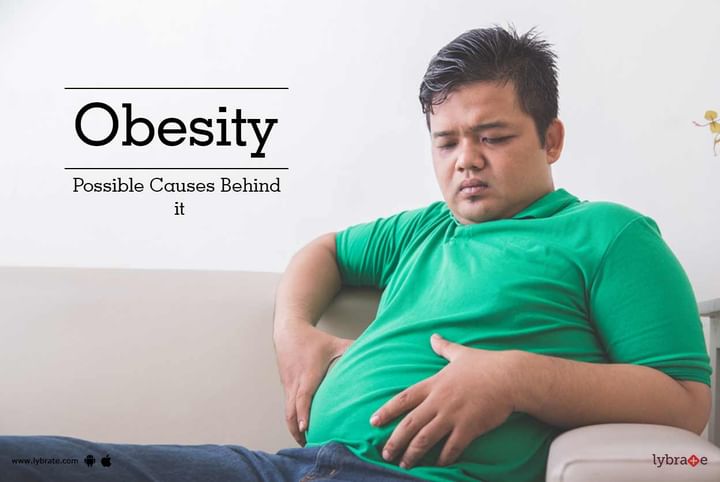Obesity - Possible Causes Behind it
According to WHO a third of the world population is obese, obesity is caused by overeating, lack of physical activity, age factor, hereditary and sometimes malfunctioning of the endocrine glands causing excessive fat accumulation. Food is meant to generate energy in the body so as to enable each and every organ to discharge its individual functions. To avoid overeating one has be careful about portion control and eat at a fixed time. Each meal should have a combination of carbohydrate 50 to 60 % of total calories + protein 35 to 40% of total calories and fat 20 to 25% of total calories. Dietary fibre of 25 to 30 grams a day can obtained from whole grain, fruits and vegetables should also be taken in sufficient quantities as it imparts a sense of satiation and reduces the food intake.
Indian diets are usually high in carbohydrates leading to higher incidence of diabetes. This can be countered by increasing proteins in each meal along with fibre,which gives a controlled balance to sugar levels in the body. Use unsaturated vegetable oils like olive, rice bran, soyabean and sunflower oil to maintain and reduce cholesterol and maintain heart health along with Omega-3 from flax seed, nuts (almonds and walnuts) or fish oil supplements, including vegetable juices in your daily diet improves the antioxidant level and fibre in the body and helps in weight loss.
How to make meal plans customized to your BMR
Step 1 - Calculate your BMR
| Women's BMR | Men's BMR |
|---|---|
| 655 | 66 |
| + (9.6* of your weight in kilos) | + (13.7* your weight in kg) |
| + (1.8*your height in cm) | + (5*your height in cm) |
| - (4.7*your age in years) | - (6.8*your age in years) |
| = ___________ Calories per day | = ___________ Calories per day |
Step 2 - After calculating your BMR ,and to start weight loss cut 200 kcal from your BMR.
For example if your BMR is 1600 kcal choose a meal plan that is 200 kcal lower I.e is from 1200 to 1400 calorie meal plan.
The main meals should be three meals like your breakfast ,lunch and dinner and the in between meals should be like fruits ,veg juice ,dry fruits,dry bhel , roasted chana, a slice of cheese ,which are not very dense in calories and high in nutrients.
STEP 3 - Eat every two hours with three main meals and three small meals.
STEP 4 - Drink plenty of water through the day at least 8 to 10 glasses.
Exercise - Lack of physical activity means there is no energy output and this results in weight gain over the period of time because as we age our BMR reduces (basal metetabolic rate : that is total number of calories your body requires for normal body functions excluding any activity factor like exercise, BMR is the energy used for metabolic process of maintaining life itself and usually accounts for two thirds of total daily expenditure ). To maintain a healthy weight increasing the BMR is essential and this means increasing the muscle mass over the fat mass as 1 pound of muscle burns 6 calories at rest and 1 pound of fat just 2 calories. Increasing muscle mass can happen only through physical exercise and adequate protein in the diet thereby, increasing fibre and reducing fat in the diet.
Advantages of Physical Activity
- Helps to keep digestive system in optimum condition
- Improves cardiac rhythm and output
- Maintains flexibility of body
- Energies blood vessels and does not allow cholesterol deposits and improved heart health as it does not allow fat accumulation
- Improves peristaltic action of intestine and rectum and removes constipation
- Helps in improving insulin resistance in the body especially in PCOD and PCOS (polycystic ovarian syndrome)
- Maintains the sugar levels in diabetic patients
Other Causes of Obesity
- Age factor: Obesity is generally prevalent in the middle age as the BMR reduces as a person ages especially if he or she does not exercise, but weight gain can be gender specific as women have more fat mass and the weight gain during pregnancy is common due to increase in fat in the diet, but in recent years there has been a rapid rise in obesity in children and teens due to over indulgence in junk and fast foods, which have high amounts of refined carbohydrates and hydrogenated fats. Heredity also plays an important role in fat accumulation. Children of obese parents do have high chances inheriting obesity from their parents as genetic factor could be a contributing factor rather than excessive food. In such cases physical activity plays a very important role for weight loss
- Untreated Hypothyroidism: Hypothyroid causes a drop in the BMR and increase in fat percentage and if untreated can cause weight gain, but once on medication they have improved metabolism.
- Drugs: Use of oral contraceptives, steroids, insulin and phenothiazines is generally followed by weight gain to stimulation of appetite.
- Alcohol: Alcohol is just empty calories and 1ml of alcohol gives 7 calories and this causes weight gain along with the fat laden food eaten while having alcohol, overeating is usually a consequence of drinking leading to weight gain and drinking coupled with smoking increases the lipid levels in the body affecting the heart health
- Fasting and Yo Yo Dieting: The process of losing weight and gaining weight several times throughout a life time is often characterised by increased fatness with each cycle (Krause food and nutrition therapy). Fasting is dropping calories to less than 600 to 800 over a period of time, which causes starvation and breakdown of muscle mass and lowering of BMR and once one gets back to normal diet there is sudden surge in weight which then gets difficult to rid off.
- Water: Incredible as it may seem water is a very important catalyst in weight loss,water suppress the appetite naturally and helps metabolise stored fat. Drinking water is best for fluid retention caused due to excessive intake of salt, the more water you take, more it dilutes the excess salt and reduces the fluid retention. Eight to twelve glasses of water in a day is the optimal intake.
- Stress: Stress is a another precipitating factor for weight gain which causes damage to the heart. Excessive stress causes an increase in cortisol and thereby, increase in fat percentage in the body and weight gain. An emotionally charged and highly strung nervous system can adversely affect the coronary arteries and deteriorate the heart. If you wish to discuss about any specific problem, you can consult a doctor.



+1.svg)
